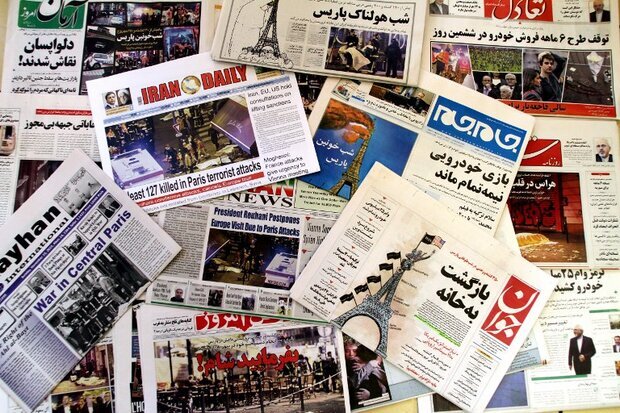Messages of hypersonic missile

In its editorial, Kayhan discussed the unveiling of the hypersonic Fattah missile. It wrote: The unveiling of the hypersonic missile can have a clear message for the governments that take illegal and arbitrary actions against in the interests of the Iranian nation.
Militarily, not only it will act as a deterrent missile, it will also show its deterrence in economic and political areas. It is because the enemy has waged a war against the Iranian nation and does not make a distinction between military, economic, political, security and cultural and even diplomatic areas. Any field is considered as a target for an attack on the Iranian nation. We must recognize the enemy’s threats and say that the result of its recourse to illegal sanctions against Iran’s interests will certainly meet our reciprocal actions.
Hamshahri: Fattah missile is not the final station
Hamshahri dedicated its editorial to the hypersonic missile as well. The paper said: It is not only the high speed that has made Fattah a missile with special characteristics. It has great maneuverability by using sophisticated thrust vector technology to cause errors in the enemy’s air defense systems. Scientific studies have so far shown that it is not possible to counter hypersonic missiles in a war, and this will guarantee the security of the Islamic Republic of Iran for the next several decades. It is clear that Fattah is not the final station to strengthen Iran’s missile power and other Fattahs will be on the way in the near future.
Shargh: Baku has turned into a playground for Tel Aviv
In an analysis, Shargh addressed the relations between Baku and Tel Aviv and its dangers for the security of the Islamic Republic. It wrote: Zionists’ efforts to establish relations with Iran’s neighbors, especially Islamic countries, will be a threat to that country and the Islamic world. Therefore, the increase of the Zionist regime’s influence in Azerbaijan can be a threat to the Caucasus region and especially to Iran, as Israel never seeks to establish peace between the Republic of Azerbaijan and the Islamic Republic of Iran or between the Republic of Azerbaijan and the Republic of Armenia to establish security in the Caucasus. In that condition, it will lose large arms contracts with Baku and have no justification to increase its influence in the Caucasus. Of course, any military, security and diplomatic movement of the Zionist regime in the Caucasus, Karabakh and the Republic of Azerbaijan is under the surveillance of our military, security and diplomatic institutions, and the smallest action against our security and interests in that region will be faced with a decisive response, but the Zionists in the current unfavorable conditions after Netanyahu’s re-election, are trying to increase their relations with Azerbaijan by launching media propaganda to somehow get out of the political pressure and regional and international isolation.
Etemad: Naval alliance proposal
Etemad discussed the reopening of the embassies of Iran and Saudi Arabia and its positive effects. It said: In the past few days, as the news of reopening Iran’s diplomatic centers in Saudi Arabia surfaced, the announcement by Iranian Navy Commander Admiral Shahram Irani about forming a joint maritime coalition between Iran and some countries in the region attracted great attention. Irani said: “The joint coalition of the Iranian Navy with the countries of the region, including Saudi Arabia, the UAE, Qatar, Bahrain and Iraq, will be formed soon.”
Although this news has not yet been confirmed by these countries, the formation of such a coalition will be important. Currently, the Fifth Fleet of the U.S. Navy based in Bahrain and also a coalition of countries including France, Britain and America provide security for commercial shipping in the Persian Gulf region. The news of such a regional maritime coalition emerges as the UAE recently declared that, after security evaluation, it has withdrawn from the U.S.-led maritime security alliance. However, the UAE said it is still committed to providing maritime security in the country's waters based on international law.
Sobh-e-No: The end of unilateralism
In its editorial, Sobh-e-No wrote: Given the recent developments at the global level and the end of unilateralism, we are seeing a global effort to end the supremacy of the West. It seems that countries are tired of the role of neutral actors and guarantors of the interests of certain countries. As the countries are trying to reduce their dependence on the West through regional and extra-regional alliances, they are opening the window of friendship towards each other so that in the new international order each of them can become an influential player in their own region.
